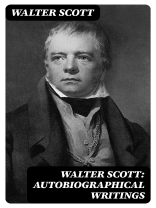In ‘Walter Scott: Autobiographical Writings, ‘ Scott delves deeply into his own life experiences, blending personal narrative with the rich historical tapestry of 19th-century Scotland. The book showcases Scott’s mastery of prose, characterized by vivid imagery and a keen sense of place, as he reflects on his formative years, literary ambitions, and the socio-political climate that shaped his epoch. Written with an informal yet erudite style, these writings serve as an invaluable lens through which to explore the intersection between his life and works, presenting readers with insights that illuminate his literary achievements and historical significance. Walter Scott, a pivotal figure in the Romantic movement, is often hailed as the father of the historical novel. His upbringing in a rural Scottish community imbued him with a profound appreciation for folklore and history, elements that permeate his oeuvre. These autobiographical writings stem from Scott’s desire to contextualize his narratives, showcasing his personal struggle and triumph as he carved out a literary identity amidst the backdrop of his evolving nation. This collection is highly recommended for readers seeking a deeper understanding of Scott’s influence on literature and history. It resonates not only as an autobiography but also as a critical contribution to the understanding of Romantic philosophy, making it essential for scholars, students, and admirers of literature looking to grasp the essence of Scott’s monumental legacy.
Sobre o autor
Sir Walter Scott, 1st Baronet FRSE (14 August 1771 – 21 September 1832), was a prolific Scottish historical novelist, poet, and historian, who is widely regarded as one of the most influential and important figures in the Romantic movement. Renowned for his ability to weave rich historical tapestry with fictional narratives, his works encompass a variety of literary themes and evoke the spirit of his time. Many of Scott’s novels were initially published anonymously, leading to great speculation as to their authorship, and adding to his mystique and celebrity. Notably, ‘Waverley’, ‘Ivanhoe’, and ‘Rob Roy’ remain among his best-known works. Scott’s writing style was characterized by his use of regional dialect, detailed character development, and intricate plots that brought to life the struggles and triumphs of his characters. In the posthumously published ‘Walter Scott: Autobiographical Writings’, readers are given a closer look at the man behind the novels, revealing his personal life, inspirations, and the hard work he poured into his vast body of work. Despite financial crises later in life, Scott’s status as a key figure in the development of the historical novel and his contributions to Scottish culture and literature remain unchallenged. His legacy endures not only in his extensive bibliography but also in the continued study and appreciation of his works and influence on literature.












